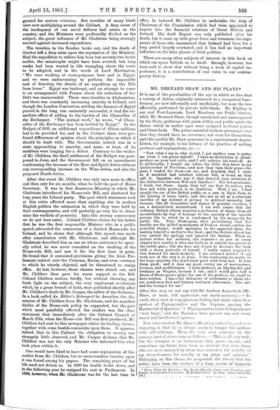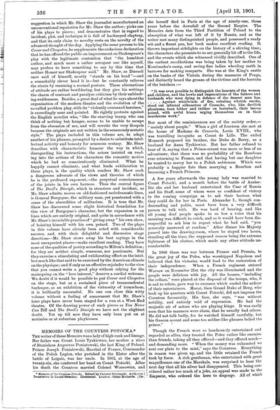MR. BERNARD SHAW AND HIS PLAYS.*
IT is one of the peculiarities of the age in which we live that a variety of duties, originally entrusted to a recognised func- tionary, are now informally and unofficially, but none the less efficiently, performed by private individuals. Mr. Kipling is our real Poet-Laureate, Lord Rosebery our Public Orator, while Mr. Bernard Shaw, though unsalaried and unrecognised by the State, performs with great ability and public spirit the duties which in earlier ages were assigned to Court jestem and Court fools. The prime essential in those personages was that they should have no reverence, not even for themselves, and this quality Mr. Shaw possesses in a supereminent degree. Listen, for example, to his defence of his practice of writing prefaces and explanations, &c.
"Now what I say is, why should I get another man to praise me when I can praise myself? I have no disabilities to plead : produce me your best critic, and I will criticise his head off. As to philosophy, I taught my critics the little they know in my Quintessence of Ibsenism; and now they turn their guns—the guns I loaded for them—on me, and proclaim that I write as if mankind had intellect without will, or heart, as they call it. Ingrates : who was it that directed your attention to the distinction between Will and Intellect ? Not Schopenhauer, I think, but Shaw. Again, they tell me that So-and-so, who does not write prefaces, is no charlatan. Well, I am. I first caught the ear of the British public on a cart in Hyde Park, to the blaring of brass bands, and this not at all as a reluctant sacrifice of my instinct of privacy to political necessity, but because, like all dramatists and mimes of genuine vocation, I am a natural-born mountebank. I am well aware that the ordinary British citizen :requires a profession of shame from all mountebanks by way of homage to the sanctity of the ignoble private life to which he is condemned by his incapacity for public life. Thus Shakespear, after proclaiming that Not marble nor the gilded monuments of Princes should outlive his powerful rhyme, would apologise, in the approved taste, for making himself a motley to the view ; and the British citizen has ever quoted the apology and ignored the fanfare. When an actress writes her memoirs, she impresses on you in every chapter how cruelly it tries her feelings to exhibit her person to the public gaze; bat she does not forget to decorate the book with a dozen portraits of herself. I really cannot respond to this demand for mock-modesty. I am ashamed neither of my work nor of the way it is done. I like explaining its merits to the huge majority who don't know good work from bad. It does them good ; and it does me good, curing me of nervousness, laziness, and snobbishness. I write prefaces as Dryden did, and treatises as Wagner, because I cam; and I would give half a dozen of Shakespear's plays for one of the prefaces he ought to have written. I leave the delicacies of retirement to those who are gentlemen first and literary workmen afterwards. The cart and the trumpet for me."
After this may we not say with Sir Andrew Agnecheek (Mr. Shaw, at least, will appreciate our mock-modesty) :—" In sooth, thou wart in very gracious fooling last night when thou spokest of Pigrogromites and the Yapians passing the Equinoctal of Queubus " ? Pigrogromitus is but Schopenliauer "writ large," and the Ibsenites have passed any and every moral and intellectual equinox.
Now what renders Mr. Shaw's effrontery endurable, and even engaging, is that he is always ready to temper his .egotism with self-criticism. Thus the very next sentence to the passage quoted above runs as follows:—"This is all very well ; but the trumpet is an instrument that grows on one ; and sometimes my blasts have been so strident that even thOse who are most annoyed by them have mistaken the noVelty 'of my shamelessness for novelty in my plays and opinionFi." Enlarging on this theme, he propounds the theory that his critics have been the -victims of--a long course of hypnotic • Three Map for Puritans lia.SteriCa_Diaciple,_Casar and Cleopatra..and Captain Brassbound's Conversion, By Bernard Shaw, London: Grant Bic:lards.
suggestion in which Mr. Shaw the journalist manufactured an unconventional reputation for Mr. Shaw the author; picks one of his plays to pieces ; and demonstrates that in regard to incident, plot, and technique it is full of hackneyed claptrap, and that its only claim to novelty rests on the novelty of the
advanced thought of the day. Applying the same process to his Omar and Cleopatra, he supplements the audacious declaration that he has offered the public an improvement on Shakespeare's play with the legitimate contention that "the humblest author, and much more a rather arrogant one like myself, may profess to have something to say by this time that neither Homer nor Shakespear said." Mr. Shaw, as Disraeli once said of himself, mostly "stands on his head "—and a remarkably clever head it is—but he constantly relieves the strain by resuming a normal posture. These alternations of attitude are rather bewildering, but they give his writings the charm of contrast and paralyse criticism by their unblush- ing suddenness. Besides, a great deal of what he says aboutthe organisation of the modern theatre and the evolution of the so-called problem play, with its "violently oversexed heroines," is exceedingly sane and pointed. He rightly protests against the English novelist who, "like the starving tramp who can think of nothing but hunger, seems to be unable to escape from the obsession of sex, and will rewrite the very Gospels because the originals are not written in the sensuously ecstatic style." The plays included in this volume axe, to adapt another of his phrases, prompted by a desire to substitute intel- lectual activity and honesty for sensuous ecstasy. Mr. Shaw describes with characteristic humour the way in which, disregarding his instructions, the actors insisted on read- ing into the actions of his characters the romantic motive which he had so conscientiously eliminated. What he happily cannot eliminate, and what lends exhilaration to these plays, is the quality which renders Mr. Shaw such a dangerous advocate of the views and theories of which he is the professed exponent,—the perpetual consciousness of the joints in his own harness. Thus the central figure of The Devil's Disciple, which in structure and incident, as Mr. Shaw admits, moves on old-fashioned melodramatic lines, is General Burgoyne, the military man, yet penetrated with a sense of the absurdities of militarism. It is true that Mr. Shaw has discovered some slight historical foundation for this view of Burgoyne's character, but the expansion is on lines which are entirely original, and quite in accordance with Mr. Shaw's invariable practice of" giving away" his own show, of hoisting himself with his own petard. Two of the plays in this volume have already been acted with considerable success, and, with their delightful and discursive stage directions—Mr. Shaw stows away his best sayings in the most unexpected places—make excellent reading. They have none of the qualities of poetry according to Milton's definition; for they are neither simple, sensuous, nor passionate. But they exercise a stimulating and exhilarating effect on the intel- lect much like that said to be exercised by the American climate on the physique; and if only as an effective rejoinder to the view that you cannot write a good play without relying for the mainspring on the "love interest," deserve a cordial welcome. We doubt if it would be possible to put Omar and Cleopatra on the stage, but as a sustained piece of transcendental burlesque, as an exhibition of the virtuosity of iconoclasm, it is brilliantly successful. No one can close this witty volume without a feeling of amazement that Mr. Shaw's later plays have never been staged for a run at a West-End theatre. Of the drawing power of such pieces as You Never Can Tell and The Devil's Disciple we have not the slightest doubt. Yet up till now they have only been put on at matinees or at suburban playhouses.







































 Previous page
Previous page